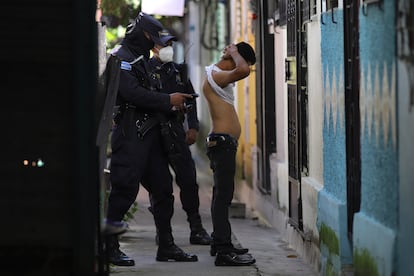Three patterns of disappearances in El Salvador under Nayib Bukele’s state of emergency
Although the government links all detentions to the country’s gangs, human rights organizations have reported 5,490 ‘direct victims’ from outside the sphere of criminal structures


Henry Joya was arrested on April 19, 2022. It was approximately 10 p.m. and he was asleep. The police dragged him out of his house in Colonia Luz, in the municipality of San Salvador, and five months later his family, having not heard anything from him, discovered that he was dead. The state of emergency declared in El Salvador by President Nayib Bukele swallowed Joya alive and then spat his corpse into a common grave in the cemetery of La Bermeja. But before that — technically and according to human rights organizations — he was a subject of “forced disappearance.”
Joya was arrested for alleged links to El Salvador’s criminal gangs and transferred to the Mariona jail, where prison authorities provided his family with information about his welfare: he suffered from a mental disability that caused him to forget many things. However, at the beginning of July, after two months of detention, Joya’s family stopped receiving news. He no longer appeared on the list of prisoners held at Mariona. Jesús Joya began to search for his brother in other jails while his family approached other government institutions to seek information about his whereabouts, all without success. Then Jesús had a fateful “premonition:” to make inquiries at the Institute of Legal Medicine (IML).
The forensic experts there showed the family a series of photographs of corpses and among them was the face of Henry, a man described by his neighbors in Colonia Luz as “helpful” and someone who “did not get into trouble.” The discovery was made on September 19, but Jesús was stunned when he was told that his brother had been buried in the mass grave 73 days earlier.
Joya’s body was exhumed in October and, according to the report issued by the IML, he died from pulmonary edema. “However, a witness who shared a cell with him in the Mariona penitentiary center told the family that he had been subjected to severe beatings by the guards and that he died as a result,” documents a report that the Due Process Foundation, along with five other Salvadoran organizations, presented to the Committee on Enforced Disappearances and the United Nations Working Group on Enforced Disappearances.
Three patterns of disappearances
Henry Joya’s case falls into one of three patterns of forced disappearances that the report prepared by the Due Process Foundation identifies under El Salvador’s emergency regime, a controversial measure Bukele enforced in March 2022 and with which he claims to have “neutralized” gang violence in Central America’s smallest country. The state of emergency has also suspended constitutional guarantees for El Salvador’s citizens and has sent over 70,000 people to prison.
Although the government links all those detentions to the country’s powerful gangs, human rights organizations have reported 5,490 “direct victims” from outside the sphere of criminal structures. The figures published by NGOs indicate that there were 13,581 “violations” up to the end of July. The most-highlighted is arbitrary detention, at 95%. However, now the phenomenon of “short-term forced disappearances” has been added to the list.
The three patterns of disappearance have elements in common: people are captured by the police or the military enforcing the state of emergency. They are arrested in public places, in the presence of witnesses. Their relatives then go to the police to request information, where it is denied that a detention has occurred and the whereabouts of the detainee are not revealed.
The first pattern — A — highlights that, after several weeks or months “relatives receive some information that allows them to find the detained person in a penitentiary center.” In pattern B, after “several weeks or months, and despite the insistence of relatives and the filing of habeas corpus, the relatives have no news of the detained person. This seems to be the most frequent pattern according to the complaints received by the organizations subscribing to this document,” the report states.
Lastly, there is pattern C, which applies to the case of Henry Joya: “They are, likewise, people captured by the police or military, in application of the state of exception, and it is officially recognized that the person has been sent to a penitentiary center. Subsequently, the family has no other official information or communication with the detained person, and after several months of searching again for their loved one, they find out through the Institute of Legal Medicine or private individuals, such as a funeral company, that their relative died in the prison. Many of these people are buried in mass graves before their relatives learn of their death,” the report states.
At the end of July last year, the government-controlled parliament approved transitory provisions and reforms to the Law against Organized Crime to increase the penalties for gang leaders and allow for mass trials. These mass hearings of up to 900 detainees were designed to prosecute entire criminal structures. In addition, the law regulating drug-related activities and juvenile criminal legislation has been reformed in “inquisitorial” ways, the report submitted to the United Nations states.
“These reforms make it easier for any person anonymously accused of committing a crime to remain in unofficial provisional detention for an unlimited period of time, to be convicted with flawed evidence, with reference witnesses, among others, facilitating the abusive use of the emergency regime,” states the Due Process Foundation.
“Armed with these legal tools, police and military have carried out massive and indiscriminate detentions of people [...] This situation is aggravated by the practice and/or de facto policy of the police and prison authorities of denying any information about the status of detained persons to their relatives or defenders,” continues the report. “Nor is there an immediate registry of persons detained, nor judicial control of the arrests. Most of them are young people in a situation of poverty and vulnerability, accused of the crime of illicit association, the legal wording of which is so broad that it allows and facilitates the apprehension of people without any basis.”
Sign up for our weekly newsletter to get more English-language news coverage from EL PAÍS USA Edition
Tu suscripción se está usando en otro dispositivo
¿Quieres añadir otro usuario a tu suscripción?
Si continúas leyendo en este dispositivo, no se podrá leer en el otro.
FlechaTu suscripción se está usando en otro dispositivo y solo puedes acceder a EL PAÍS desde un dispositivo a la vez.
Si quieres compartir tu cuenta, cambia tu suscripción a la modalidad Premium, así podrás añadir otro usuario. Cada uno accederá con su propia cuenta de email, lo que os permitirá personalizar vuestra experiencia en EL PAÍS.
¿Tienes una suscripción de empresa? Accede aquí para contratar más cuentas.
En el caso de no saber quién está usando tu cuenta, te recomendamos cambiar tu contraseña aquí.
Si decides continuar compartiendo tu cuenta, este mensaje se mostrará en tu dispositivo y en el de la otra persona que está usando tu cuenta de forma indefinida, afectando a tu experiencia de lectura. Puedes consultar aquí los términos y condiciones de la suscripción digital.








































